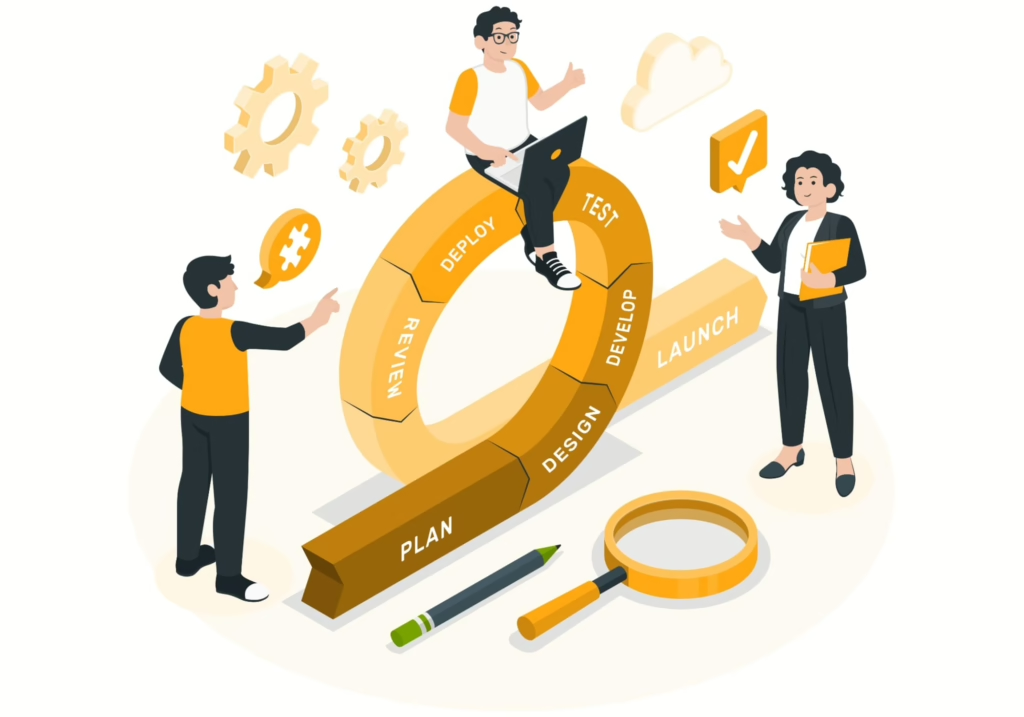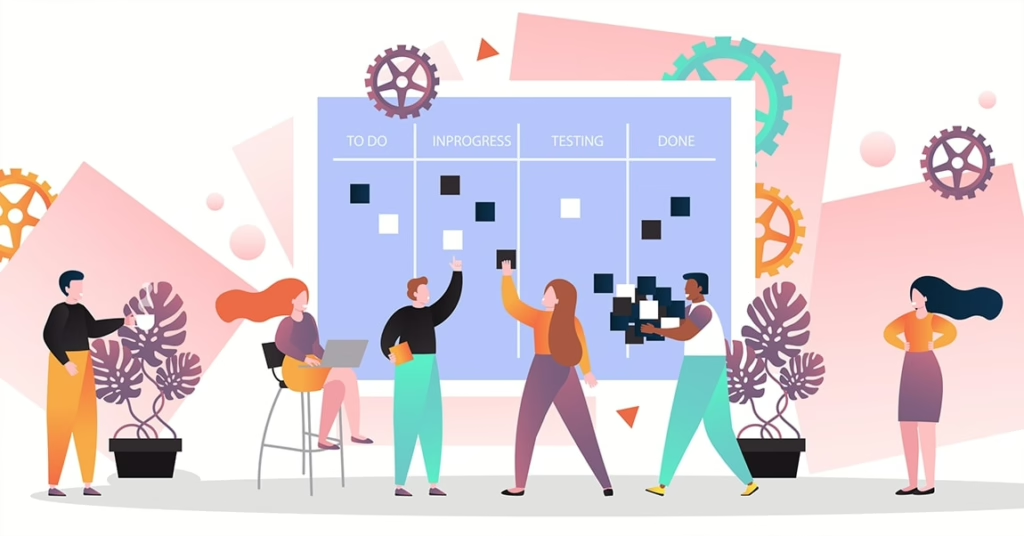Nowadays, managing an app development project effectively is crucial for the success of any mobile application. App development project management involves overseeing the planning, execution, and delivery of an app from conception to release. This guide will provide an in-depth understanding of how to manage an app development project, the importance of software project management, and the different methodologies used in the industry.
Table of Contents
Understanding App Development Project Management
App development project management is the process of leading and managing a team of developers, designers, and other stakeholders to successfully deliver a mobile application. It involves coordinating tasks, resources, timelines, and ensuring the app meets the specified requirements and quality standards.
At its core, app development project management aims to create a structured approach that reduces risks, improves efficiency, and ensures the delivery of a high-quality product. Effective software project management helps minimize project failures, streamline communication, and foster collaboration among team members.
Managing an app development project requires knowledge of both mobile app development lifecycle and the different types of project management methodologies. A well-managed project follows a clear plan, avoids unnecessary delays, and ensures that the app meets user expectations.
The Importance of Project Management in App Development
In app development, the complexity of coordinating various tasks, teams, and technology stacks makes effective project management essential. Without proper management, projects may face issues such as scope creep, delayed timelines, and cost overruns.
Here are a few reasons why app development project management is important:
- Efficient Resource Allocation: A good project manager ensures that resources, such as developers, designers, and testers, are allocated efficiently to avoid delays.
- Clear Communication: With multiple team members working on different aspects of the project, clear communication is vital. Project management ensures that everyone is on the same page.
- Risk Mitigation: Proper planning and risk management can help foresee potential roadblocks, allowing for proactive solutions.
- Timely Delivery: By following a structured management process, teams can work towards meeting deadlines and delivering the app on time.
- Quality Control: Project management helps ensure that the app is tested rigorously for bugs and functionality issues before it’s released to the public.

Key Stages of App Development Projects
The mobile app development lifecycle typically includes several stages, each requiring detailed management and coordination. The following are the key stages in app development:
1. Ideation and Planning
In this initial stage, the project team gathers requirements, defines the app’s purpose, and outlines the technical specifications. This phase also includes conducting a market analysis to ensure the app will meet user needs. A comprehensive plan is created that covers timelines, resources, and costs.
2. Design
This phase includes creating wireframes, mockups, and user interface (UI) designs. It’s essential to focus on the user experience (UX) to ensure the app is intuitive and user-friendly. The design stage also involves collaboration between designers and developers to ensure that technical requirements are met.
3. Development
During the development phase, the project team starts coding the app. The development process can be broken down into front-end and back-end development. Project managers coordinate tasks and ensure that development is progressing according to plan. This is often the longest phase and requires consistent monitoring.
4. Testing
After development, rigorous testing is conducted to identify bugs and improve the app’s functionality. Testing includes unit tests, integration tests, and user acceptance testing (UAT). During this phase, project managers ensure that the app meets all quality standards and that issues are resolved promptly.
5. Launch
The app is now ready for release to the public. This phase involves preparing the app for deployment to app stores (such as the Google Play Store or Apple App Store). Project managers oversee the launch and ensure that all stakeholders are informed.
6. Post-Launch Maintenance
Once the app is launched, there is usually a period of maintenance to fix bugs, add new features, and address user feedback. Project managers continue to oversee improvements and updates, ensuring that the app stays relevant and functional.
Types of App Development Project Management
There are several project management approaches that can be used in app development project management, each offering different methods for structuring the project workflow. Below are some of the most commonly used types:
1. Waterfall Model for App Development
The Waterfall model is a traditional project management approach where each stage of the project must be completed before moving on to the next. This model is best suited for projects where requirements are well-defined upfront and unlikely to change during development. However, it can be inflexible when dealing with evolving project needs.
2. Agile Project Management
Agile project management is one of the most popular approaches in app development due to its iterative and flexible nature. It focuses on delivering the product in small, manageable chunks (sprints). Agile allows for frequent revisions based on user feedback and changing market needs, which makes it ideal for mobile app development where user requirements can evolve over time.
Agile methodologies, such as Scrum and Kanban, are widely used in the industry. They emphasize continuous improvement, communication, and collaboration, making them perfect for managing mobile app projects.
3. Scrum Methodology
Scrum methodology is an Agile framework that divides the app development process into smaller, time-boxed iterations called sprints. Scrum teams typically consist of developers, a Scrum Master (who oversees the process), and a Product Owner (who represents the stakeholders). Scrum is particularly effective for teams working on complex, large-scale projects where flexibility and constant communication are necessary.
4. Kanban for Software Projects
Kanban for software projects is another Agile methodology that focuses on visualizing the workflow and limiting work in progress (WIP). This approach helps teams to identify bottlenecks early and improve efficiency. Kanban uses boards to track tasks, making it easy to see which parts of the project are being worked on and which are ready for review or testing.
Popular Methods for App Development Project Management
App development project management methodologies are diverse, but the key to choosing the right method depends on the project scope, team size, and flexibility required. Here are some of the most popular methods for managing app development projects:
1. Agile Project Management
As mentioned, Agile is the preferred method for many app developers due to its flexibility, continuous feedback, and iterative approach. Agile project management encourages rapid prototyping, testing, and improvement, making it ideal for fast-paced app development.
2. Scrum Methodology
Scrum is widely adopted in mobile app development projects due to its structure, focus on deliverables and team collaboration. Scrum teams typically work in sprints and use a Product Backlog to prioritize tasks.
3. Waterfall Model
The Waterfall model is used in more traditional software projects where requirements are fixed and there is little scope for changes. It is often chosen for app development projects where the timeline and resources are strictly defined, and the requirements are unlikely to change during the project.

A Summary of Tools and Technologies for Effective Project Management
Effective app development project management relies heavily on the right tools and technologies to streamline communication, track progress, and manage tasks. Below is a summary of popular tools and technologies used in the industry:
- Trello: A flexible Kanban-based project management tool that helps teams manage tasks and workflows. In fact, Trello has over 90 million registered users.
- JIRA: A widely used tool in Agile project management, especially in Scrum, for tracking issues and managing sprints.
- Asana: A versatile tool that can be used for both Agile and Waterfall projects to organize tasks, track timelines, and ensure transparency.
- Basecamp: A simple project management tool that focuses on communication and task management.
- GitHub: A code management platform that is essential for version control and collaboration among developers.
- Slack: A communication tool that integrates with various project management platforms to ensure real-time collaboration.
Frequently Asked Questions
1. What is the role of a project manager in app development?
A project manager in app development project management oversees the entire development process, coordinates teams, ensures deadlines are met, and ensures the app meets business requirements. They also manage resources, risks, and stakeholder expectations.
2. Which project management methodology is best for mobile app development?
Agile project management, especially using Scrum or Kanban, is often considered the best for mobile app development due to its flexibility and focus on iterative progress.
3. What are the key tools for app development project management?
Popular tools for app development project management include JIRA, Trello, Asana, and Slack. These tools help teams collaborate, track progress, and manage tasks efficiently.
4. What is the mobile app development lifecycle?
The mobile app development lifecycle includes stages such as ideation, design, development, testing, launch, and post-launch maintenance. Each stage requires detailed planning and management to ensure the project’s success.
Conclusion
In short, app development project management is essential for delivering high-quality apps on time and within budget. By choosing the right methodologies, tools, and maintaining clear communication, project managers can significantly enhance the success of mobile app projects. For a seamless app development experience, consider partnering with Vinova, a company specializing in effective project management and custom mobile app solutions. Let us help you turn your vision into reality. Contact us today!